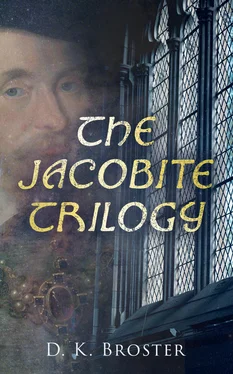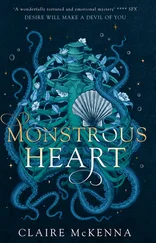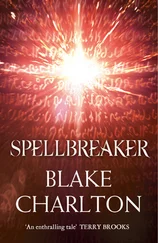“Come on and take me,” he said provocatively, flourishing his sword. “You are not afraid, surely, of a lame man!” And he pointed with it to the rough staff at his feet.
Under his tan the large young Highlander seemed to flush slightly. “I know that you are lame; and your forehead is cut. You had a fall; I came upon your dead horse. That is why I do not wish to fight you. Give up your sword, sir; it is no disgrace. We are two to one, and you are disabled. Do not, I pray you, constrain me to disable you further!”
Hang the fellow, why did he behave so out of his cateran’s rôle? “You are considerate indeed!” retorted Captain Windham mockingly. “Suppose you try first whether you can disable me further!—Now, Mr. Cameron, as I don’t intend to be stopped on my road by mere words, I must request you to stand out of my way!” And—rashly, no doubt, since in so doing he no longer had one eye on that murderous-looking gillie—he advanced sword in hand upon his reluctant opponent. Frowning, and muttering something under his breath, the young man with the eagle’s feathers at last drew his own weapon, and the blades rang together.
Thirty seconds of it, and Keith Windham knew that he had attacked a swordsman quite as good if not better than himself. Breathing hard, he was being forced back to the trunk of the oak again, and neither his aching head nor his damaged ankle was wholly to blame for this. Who said that broadsword play was not capable of finesse? This surprisingly scrupulous young barbarian could have cut him down just then, but he drew back when he had made the opening. The certitude of being spared irritated the soldier; he lost his judgment and began to fight wildly, and so the end came, for his sword was suddenly torn from his hand, sailed up into the oak-tree above him, balanced a moment on a branch, and then fell a couple of yards away. And his adversary had his foot upon it in a second.
As for Keith Windham, he leant back against the oak-tree, his head all at once going round like a mill-wheel, with the noise of a sluice, too, in his ears. For a flash everything was blank; then he felt that someone was supporting him by an arm, and a voice said in his ear, “Drink this, sir, and accept my apologies. But indeed you forced me to it.”
Keith drank, and, though it was only water, sight was restored to him. It was his late opponent who had his arm under his, and who was looking at him with a pair of very blue eyes.
“Yes, I forced you to it,” confessed Captain Windham, drawing a long breath. “I surrender—I can do nothing else, Mr. . . . Cameron.”
“Then I will take you home with me, and your hurts can be dressed,” said the Highlander, showing no trace of elation. “We shall have to go back as far as the pass, but fortunately I have a horse. Lachuinn, thoir dhomh an t-each!”
The gillie, scowling, brought forward the grey. His captor loosed Keith’s arm and held the stirrup. “Can you mount, sir?”
“But I am not going to ride your horse!” said Keith, astonished. “It will not carry two of us—and what will you do yourself?”
“I? Oh, I will walk,” answered the victor carelessly. “I assure you that I am more accustomed to it. But you would never reach Ardroy on foot, lame as you are.” And as Keith hesitated, looking at this disturbing exponent of Highland chivalry, the exponent added, hesitating a little himself, “There is only one difficulty. If you are mounted, I fear I must ask you for your parole of honour?”
“I give it you—and that willingly,” answered Keith, with a sudden spurt of good feeling. “Here’s my hand on it, if you like, Mr. Cameron!”
Table of Contents
If to ride along a road in these mountain solitudes was distasteful, to be following a mere track (and that a very steep one) in amongst their very folds was worse. When first he had seen the path which they were to ascend, and the V-shaped depression, sharp against the sunset sky, up to which it led, Captain Windham had with difficulty repressed an exclamation of alarm. However, he could not really believe that Mr. Cameron of Ardroy was taking him up this terrifying route in order to slay him, since he could already have done this with so much less trouble on level ground. Therefore, though he had raised his eyebrows, he had said nothing. After all, it was the horse, and not he, who had to do the climbing. And now they were half-way up.
The wolf-like attendant, carrying the surrendered sword, kept in the rear, but Captain Windham was almost physically conscious of his frown behind him. This unattractive person was, he felt, no willing party to his capture; he would much have preferred that the redcoat should have been left cold beneath the oak-tree. Meanwhile his master, the young chieftain, or whatever he was, walked with a mountaineer’s elastic step at the horse’s head, occasionally taking hold of the bridle; rather silent, but uncommonly well-made and good-looking, thought his captive again, glancing down at him.
Captain Windham’s own dark, rather harsh features were not unpleasing, save when he frowned, which he was somewhat given to doing, nor were they devoid of a certain distinction, and he had really fine hazel eyes. But his mouth had already taken a cynical twist unusual in a young man of thirty. If he had a passion left in life, it was military ambition. Earlier he had known others, and they had brought him nothing but unhappiness. As a boy he had had an extraordinary devotion to his lovely mother—whom he had not been alone in thinking fair. But she, too, was ambitious, and her second marriage, to the Earl of Stowe, with its attendant advantages, was more to her than the claims of her own son. Then the beautiful boy she bore to Lord Stowe usurped the place which Keith had never had in her heart. So, in respect of affection, sometimes even of ordinary attention, he had passed through a neglected childhood and a starved boyhood, and they had left an indelible mark on him—more indelible, though he did not guess it, than the scars of another woman’s betrayal of him four years ago.
The consequence was that at thirty, with a nature at bottom passionate and impulsive, he had become as disillusioned, as little prone to enthusiasms, as a man of twice his age. His creed was that it was a mistake to desire anything very much—a fatal mistake to desire a place in any person’s affections, or to admit anyone, man or woman, to a place in your own. By the end of life, no doubt, every human being had discovered this truth; he had done so early, and could count himself the more fortunate.
At the same time it needed a rather different kind of detachment to take his present situation philosophically; and yet, to his own surprise, Keith Windham knew that he was doing so, even though he had by now gleaned from his captor the later history of the day’s disaster, and had learnt its mortifying completeness. Matters had fallen out for the unfortunate recruits almost exactly as Captain Windham had afterwards feared; for another body of Highlanders was following them unseen on the hillside, and near the head of Loch Lochy further progress had been barred by those who had attempted to stay Keith himself. Though Captain Scott too had tried to cross the isthmus, it was impossible, since more Highlanders were hastening to the spot from that direction also. Too tired and panic-stricken to use their muskets to good effect, the redcoats had, on the contrary, received a fire which had killed five of them and wounded a dozen, including Captain Scott himself. Some leader called ‘Keppoch’, Captain Windham heard, had then called on the Royals to surrender, or they would be cut to pieces, and to save his men Captain Scott had done so. Immediately on this had come up Ewen Cameron’s chief, Lochiel (who had been asked for assistance), with a number of his clan, including the present narrator, had taken charge of the prisoners, and marched them off to his house of Achnacarry. But as the Highlanders from the far side of Loch Oich reported having seen a dead charger on the road, and one company of the redcoats was plainly captainless, Lochiel had sent his young kinsman, since he happened to be mounted, in pursuit of the missing officer. (And at this point the officer in question had remarked rather stiffly that he trusted Mr. Cameron knew that his absence from the scene of conflict was due only to his having gone for reinforcements, and Mr. Cameron had replied politely that no other explanation had even occurred to him.)
Читать дальше












